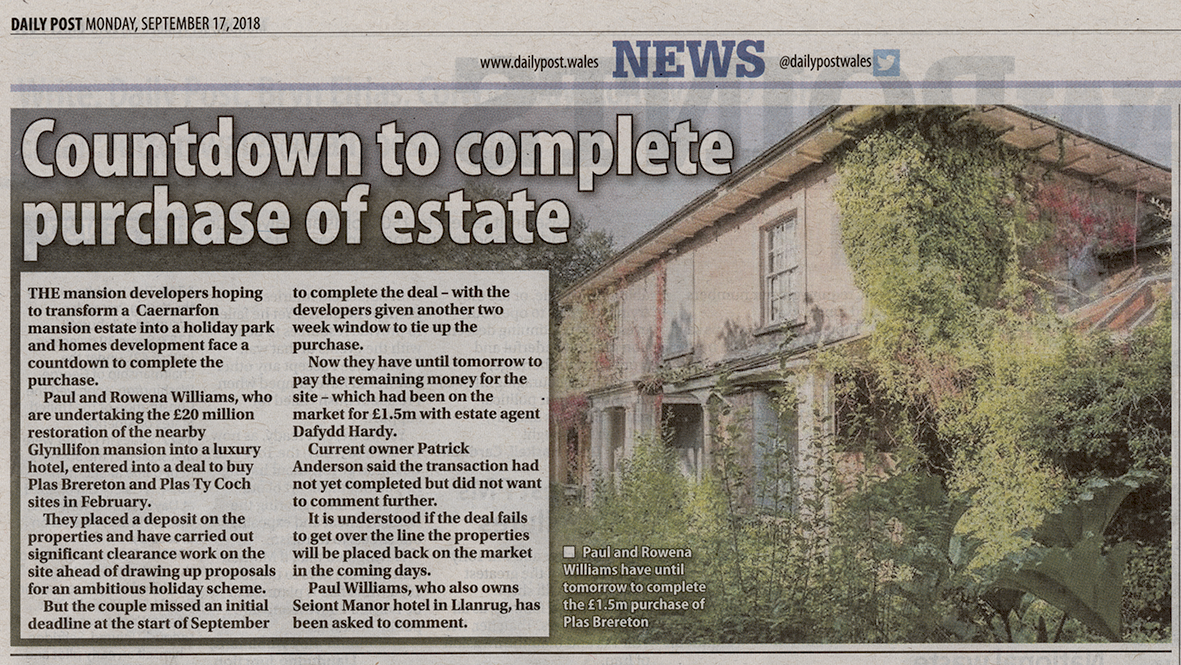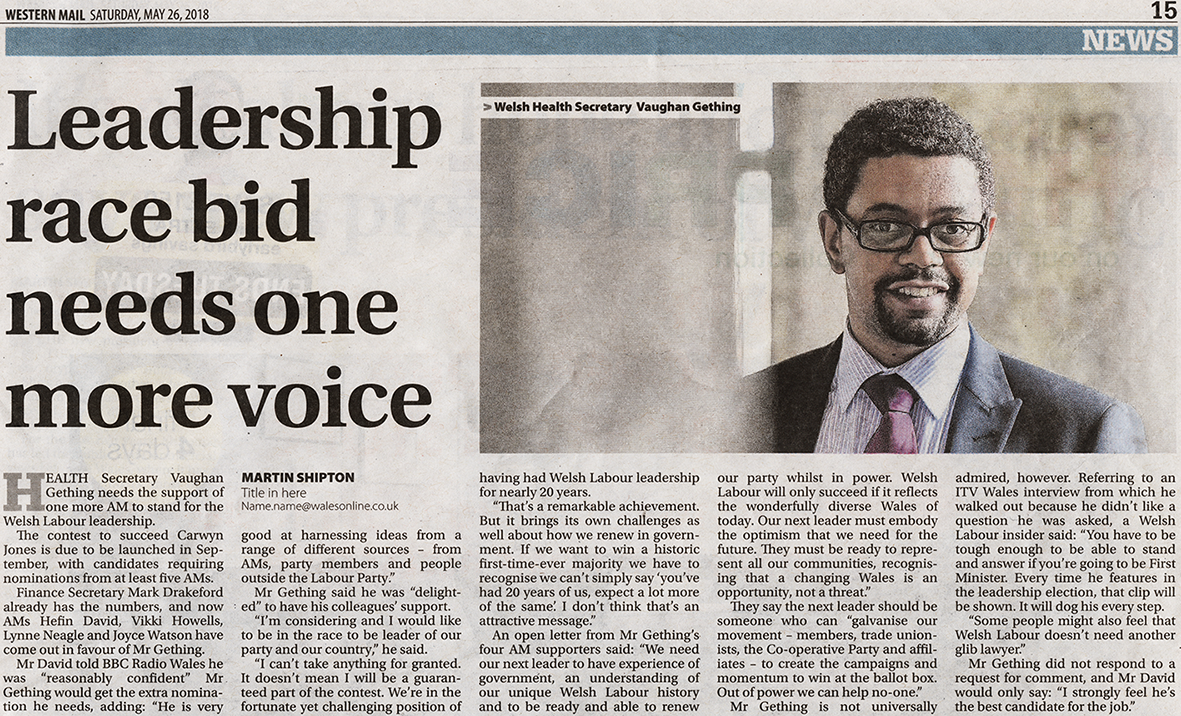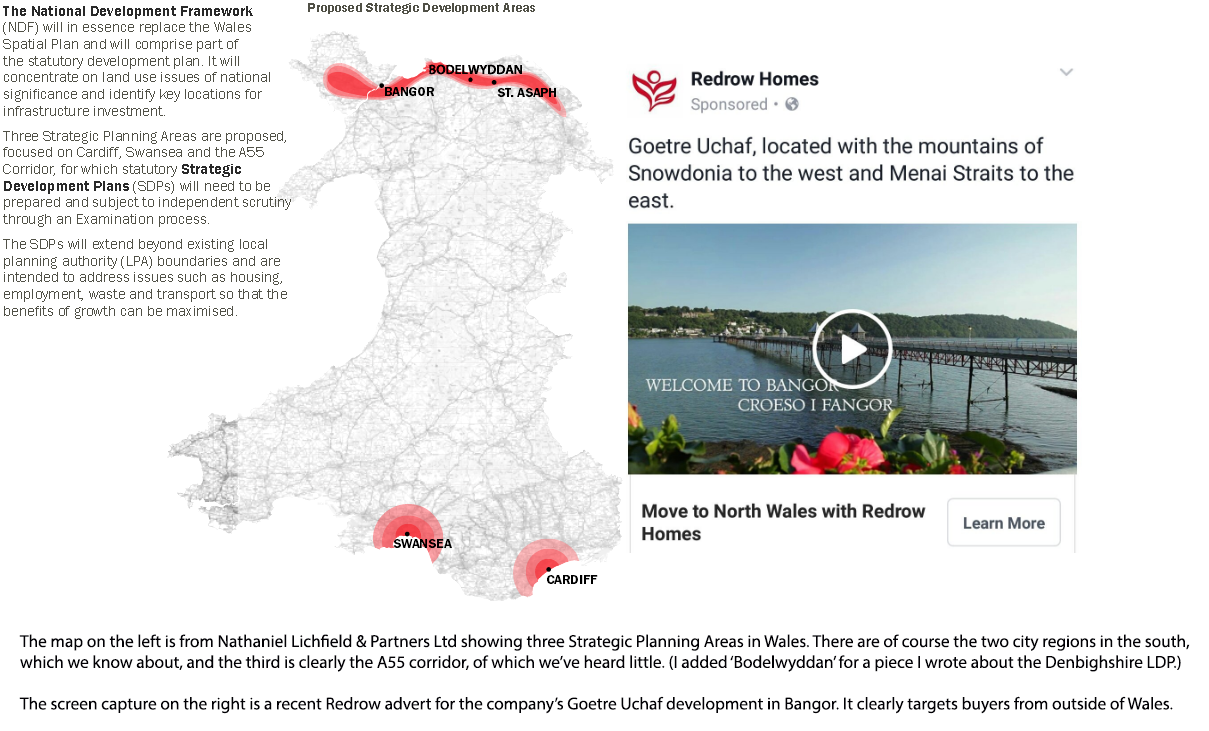It’s been a while since I wrote the previous instalment in this saga, August 6th to be precise, and even though I have no earth-shattering revelations for you, it’s clear that we are moving towards a conclusion.
But for newcomers – or even even regulars who may have forgotten how we got to where we are – here are links to the previous instalments: Weep for Wales, Weep for Wales 2, Weep for Wales 3, Weep for Wales 4, Weep for Wales 5, Weep for Wales 6, Weep for Wales 7, Weep for Wales 8.
In addition to this latest post being an update on the saga, I shall also use it to give some thought to what this incredible story tells us about the state of modern Wales. Basically, how the hell did Paul and Rowena Williams and their associates get away with so much for so long?
Because irrespective of what now happens to those you’ve been reading about over the past few months there are others who have questions to answer, and I might as well do the asking, because nobody else will.
◊
WHY DID THEY GET A FREE RIDE?
The Daily Post‘s involvement in this saga is quite extraordinary in its willingness to publish any old nonsense. I have drawn up a list of the DP’s articles on Plas Glynllifon and the other Gwynedd properties since Paul and Rowena Williams first became involved.
Starting with this article on 10 June 2016 telling us that the mystery owner of Plas Glynllifon – speaking through property company Lambert Smith Hampton (LSH) – said that the renovation would take three years, and would cost an estimated £5m.
The next article was just a few days later on 14 June 2016, and this time we were told that the old pile was to be transformed into a luxury hotel and spa with the project managed by LSH.
Just a day later, 15 June 2016, there was another report, but it was little different to the one the previous day.
The new year brought this piece on 22 February 2017 in which the Daily Post was graciously granted access, to be told by Rowena Williams, “We hope that the project will hold dear to the Prince of Wales, who enjoyed his investiture ball here and also takes a very keen interest in our heritage and historic properties such as Glynllifon. We hope that he will be an asset to the project.”
We were not informed if Carlo had been asked to cough up a few quid towards the “£5.5 to £6.5” needed for the restoration. Maybe it wasn’t needed, for a finance package had been agreed with “Together in Manchester”. And Team Williams was also “in talks with the Welsh Government about grant support”.

On 23 May 2017 we learnt that the owners of Plas Glynllifon had enlisted the help of Lord Newborough (whose family pile Plas Glynllifon had once been), and also helping Paul Williams were “Bangor University, the Institute for the Study of Welsh Estates (at Bangor Uni), Gwynedd Archives, and other bodies”. The more the merrier!
On 28 May 2017 the Daily Post invited us to take a look inside Plas Glynllifon. The accompanying film has Rowena Williams telling us that ” . . . outside, in the exterior, we’ve got lots of, um, plans going ahead with, um, with flower and fauna . . . “, to a backdrop of nineteenth century kitsch meets suburban Wolverhampton.
There was now a gap until 26 November 2017, and an article headlined, “Take a look at stunning £16m transformation of historic mansion into five star hotel”, which was a bit naughty, because Paul and Rowena Williams have not spent anything approaching £16m at Glynllifon. There was no explanation for how the cost of renovating Plas Glynllifon had increased from £5.5m-£6.5m in May to £16m in November. Brexit, I suppose.
There was yet another video, this one without the Gruesome Twosome but with weird musical accompaniment. Then there were photos, of, er, scaffolding; while inside the building, we saw a bath, an organ, statues and a four-poster bed. This article, like previous ones, drew a number of positive comments, including one from ‘MarkoMarko’, who I suspect may not be local, and may even have been an employee of the Williams gang.

The final plug report of the year was on 4 December 2017. Now the focus switched to the Seiont Manor Hotel , lined up for a £5m expansion. This would involve, ” . . . extending the restaurant with the provision of a new lake view terrace, expansion of the existing leisure facilities to improve the changing and spa facilities and add treatment rooms, a purpose built lake side function suite with bedrooms above and luxury lodges in the grounds”.
The first article in the new year appeared on 7 February 2018 and the focus switched again, this time to a snowy Plas Brereton and Plas Tŷ Coch, which we were told Paul and Rowena Williams were buying. The obligatory video introduced ageing juvenile lead Rikki Reynolds, general manager of the Seiont Manor Hotel.
This new project included, “a 100 bedroom hotel with a pool, spa, restaurants and bars”. There was to be a seafood restaurant, and holiday cottages, with the Daily Post adding, “They (Paul and Rowena Williams) said the residential parts of the project will help with funding for other parts of this 240 job scheme and the ongoing restoration at Glynllifon and expansion of Seiont Manor in Llanrug, which they also own.”
Two hundred and forty jobs! This is bullshit piled so high that it must have blocked out the sun. But by this stage if Paul Williams had said he was Jesus Christ come to give us all another chance the Daily Post would have reported it without question . . . and of course with a video.
Just three days later, on 10 February 2018, the Daily Post returned to Plas Brereton and Plas Tŷ Coch, for which, we were told, “project proposals have come and gone”; but things were to be different this time with Paul and Rowena Williams and the boy wonder. Maybe, but the video was the same one we’d seen three days earlier. We also heard of a new player in “Developer Plas Glynllifon Group”, of which no one has seen hide nor hair since.
On 27 April 2018 a fire was reported at Plas Tŷ Coch. ‘Disgraceful’ behaviour according to Paul Williams (a man who knows a thing or two about disgraceful behaviour). The Daily Post took the opportunity to remind us that Plas Tŷ Coch would be restored (sic) into luxury period apartments with low density housing in the grounds of the mansion and the restoration of walled and formal gardens.
I’m losing track now of how many apartments, houses, lodges, are involved with the Williams’ properties. Add them to the hotels, restaurants, pools, spas, bars and God knows what else and it’s getting bloody crowded!
Did it never occur to anyone that this bloke might be a sinister kind of Walter Mitty?
On to 11 May 2018 when we were told that Paul and Rowena Williams intended to part-fund their ambitions in the north through the sale of those properties they owned in Powys and over the border. This was the £10m ‘sale’ to convicted fraudster Keith Partridge, which was about as convincing as a ‘Welsh Labour’ Party manifesto.
The cost of renovating Plas Glynllifon was now £20m, up from £5.5m to £6.5m a year earlier. Inflation on this scale is no problem if you’re fluent in bollocks, pluck figures out of thin air, and are trying to wangle grants . . .
We only had to wait one day, to 12 May 2018, for the next intriguing episode headed, “Take a look inside stunning Plas Glynllifon as restoration continues”. And we were treated to yet another video and more photos of scaffolding and further examples of Victorian interiors at their worst.
Giving us an effect that is quite overwrought and claustrophobic. I can only assume that this bedroom would be the Edgar Allan Poe Suite. Who’s that in the mirror!

The Daily Post went for its hat-trick with three consecutive days’ coverage on 13 May 2018, with the emphasis now shifting to the parkland and pleasure gardens around Plas Glynllifon. For the headline told us “Mansion owners in ‘advanced talks’ to take ownership of Parc Glynllifon country park”.
If this carried on it was only a matter of time before Paul Williams approached Cyngor Gwynedd with an offer they couldn’t refuse to buy the whole bloody county.
The long-awaited news of open days at Plas Glynllifon was brought to us on 6 June 2018. There was yet another video, this one confirming that a number of deliveries had been received from the local garden centre, with photos of the happy couple, scaffolding, and the Edgar Allan Poe Suite.
Weep for Wales appeared 8 June 2018.
The cobwebs were blown away when, on 9 June 2018, we were back to the bracing air of Plas Brereton on the Menai Strait, and among fresh proposals for the site was a fishing village! So if we add that to the apartments, houses, lodges and hotels, how much accommodation does that give us? How much extra accommodation does the Caernarfon area need?
We made another slight detour on 16 June 2018 as Paul Williams’ house-trained “expert in land and heritage conservation”, dragged up specially from Cornwall, tut-tutted about the state of Parc Glynllifon and suggested that it was in such a mess it should be handed over to Paul Williams at a knock-down price.
Of the accompanying photos two were of scaffolding. (They can grow on you!)
Weep for Wales 2 appeared 19 June 2018.
Weep for Wales 3 appeared 29 June 2018.
Weep for Wales 4 appeared 3 July 2018.
Weep for Wales 5 appeared 8 July 2018.
Maybe my blog was being read at the Daily Post, for the uncritical plugs stopped and the first cloud appeared in the Williams firmament with the report of 11 July 2018 headlined, “Welsh Government considering whether grant funding to mansion developers can be recouped after hotels close”, a reference to the closure of the Radnorshire Arms Hotel In Presteigne and the Knighton Hotel in the town of that name.
For all I know there might have been other articles that I’ve missed, but the 18 I’ve listed here tell an alarming tale of a gang of shysters given free access to an important source of local news. For they were allowed to say anything they wanted with nary an awkward question, let alone any journalistic digging to find out who they really were.
And it wasn’t just the Daily Post that was guilty of unquestioning plugs. There was Business News Wales on 8 March 2017. BBC Wales 27 June 2018. The Caterer 29 June 2018. The Daily Mail 1 July 2018, etc., etc.
But as the local ‘paper the Daily Post is more guilty than others of not doing its homework on these crooks. Indeed, the other news outlets may have been attracted to Glynllifon by the endless plugs they saw in the Daily Post. Seeing as they got it so wrong with Paul and Rowena Williams we have to ask if the Daily Post will identify the next shysters arriving on its patch, or will it be more free and uncritical publicity.
Because I can predict with certainty that the easy ride Paul and Rowena Williams received from the local media, the council and others, will encourage other crooks to chance their arm in Gwynedd.
Of course, I tried to post comments to the endless ‘Aren’t they wonderful!’ stories about Paul and Rowena Williams; trying to warn people, but I’m blocked from the Daily Post and WalesOnline websites.
The question for newspapers and other media outlets before repeating press releases, or running encomiums, must always be – ‘What do we really know about these people?’ And if the answer is ‘Nothing’, or ‘Very little’, then start digging!
◊
THE FAT LADY IS WAITING IN THE WINGS
In the previous episode I told you that Leisure & Development Ltd was in the hands of receivers and the establishments involved locked, with CCTV installed. Since then I’ve heard that Paul Williams was still getting access to some of the buildings, for example, to the Knighton Hotel, either from the flat or ground floor showroom he still owns.
The latest information I have says that an offer has been made for the Radnorshire Arms by some local nobs who hope to start refurbishment work early next year. There is also interest in the Knighton Hotel and the properties in England and Cornwall, all of which might be offered for sale very soon.
In Gwynedd, things are also moving to a conclusion. For example, in the extracts you’ve just read from the Daily Post you’ll see that Plas Brereton and Plas Tŷ Coch crop up quite regularly, with ludicrous plans for fishing villages and God knows what else – but Paul and Rowena Williams never owned these properties!
They seem to have put down a deposit but never got around to paying off the balance. The deadline to complete the sale passed on Tuesday 18 September, and so, on the reasonable assumption that the balance was not paid, Paul and Rowena Williams are now left with Plas Glynllifon and the Seiont Manor Hotel, the latter run for them by drug-dependent Rikki Reynolds.

The Daily Post couldn’t forget old habits and tried to put a positive spin on the story, as if the deal would be finalised . . . as if non-completion was a mere oversight . . . nothing to do with the money having dried up . . . the other properties being in the hands of liquidators . . . everything falling apart . . .
STOP PRESS: But, finally, on Wednesday 19 September the Daily Post was forced to submit to reality and admit that the deal had fallen through.
I now visualise Paul Williams holed up in Plas Glynllifon, something like Jean Gabin in Le Jour se Lève, chain-smoking Gauloises and ready to shoot it out with the flics receivers. (God! I must lay off the Malbec!)

But enough of 1930s French movies and the Daily Post, what about other individuals and agencies we’ve encountered in this saga, how do their roles stand up to scrutiny?
UPDATE 21.09.2018: Today the Daily Post reported that Dyfed Powys Police had met with Powys County Council trading standards officers last week to discuss the now closed Powys hotels owned by Paul and Rowena Williams.
Paul Williams was quoted as saying, “We are unaware of any meeting allegedly held between the local authority and the police in Powys. However, we are pleased to hear that they are looking into matters as this will without doubt vindicate Rowena and I.”
The Daily Post‘s reporting was again abysmal. Just two days ago, Owen Hughes, the DP’s Business Correspondent – who has written all the puffs for Paul and Rowena Williams – told us that the deal to buy Plas Brereton and Plas Tŷ Coch had fallen through, but today he wants us to believe that they’ve “agreed the purchase” of these properties.
Can’t he remember what he’s written . . . or did somebody else write it?
Not only that, but he sticks to the Williams story about these Powys properties having been sold to convicted fraudster Keith Partridge, when everyone else knows this was just a ploy allowing them to slip away and lay the blame on somebody else.
UPDATE 22.09.2018: Daily Post reports statement from Paul Williams.
◊
SUPPORTING CAST
Plas Glynllifon is a Grade 1 listed building. The Radnorshire Arms in Presteigne and the Knighton Hotel are both Grade II listed buildings. (Plas Brereton and Plas Tŷ Coch are also listed.) Which means that they come under the watchful eye of Cadw, or English Heritage (West) as it is more honestly known.
Cadw/EH(W) awards grants to those owning listed properties, and so, given Paul and Rowena Williams’ talent for sniffing out easy money, it would be reasonable to assume that they applied to Cadw/EH(W) for funding. And this is what I’m told happened. I’m further told that grant funding was given.
More specifically, large amounts were given to the Powys properties, enough for Williams to claim that grants had paid for the Knighton Hotel. While in Gwynedd, it’s reported that there was a dispute between Paul and Rowena Williams and Cadw/EH(W) over a grant given to Plas Glynllifon which appeared to have been diverted to the Seiont Manor Hotel.
In the hope of getting the facts I submitted a FoI request to Cadw/EH(W), but if the reply I received is to be believed then the Williams gang haven’t received a penny. Read it for yourself.
Which means that either my informants are mistaken, or else – and I hate to even consider this possibility! – Cadw/EH(W) is telling old Jac porkies!
∼
With Paul and Rowena Williams’ empire now reduced to Plas Glynllifon and Seiont Manor it’s worth asking what roles have been played by the local council and Grŵp Llandrillo Menai which runs the adjoining Glynllifon Agricultural College.
Cyngor Gwynedd has remained tight-lipped, saying only that Plas Glynllifon is privately owned and has nothing to do with the council. Which I suppose is fair enough up to a point, but the council must have concerns when such a prominent local building is constantly changing hands between dreamers and crooks.
Grŵp Llandrillo Menai has said even less, which for me is more worrying, Because if we go back to 13 May the Daily Post was headlining a story “Mansion owners in ‘advanced talks’ to take ownership of Parc Glynllifon country park”. And the report went on, ” . . . discussions are underway with Gwynedd council and Grŵp Llandrillo Menai over taking control of parts of the vast estate grounds surrounding the mansion”.

So how far did these talks progress? Were they concluded with an agreement to hand over land to Paul and Rowena Williams? In light of recent developments, how difficult would it be for Cyngor Gwynedd and Grŵp Llandrillo Menai to issue a statement assuring us that no deal was done? I suggest they owe it to us.
∼
A name that has cropped up throughout this case is that of property company Lambert Smith Hampton, and in particular Dudley James Cross, who often seemed to act as a personal advisor to Paul and Rowena Williams, or perhaps even a partner, for at one time he was a director of Leisure & Development Ltd, the company that was ‘sold’ on 1 February to Keith Partridge, but then went tits up.

You’ll notice that on his Linkedin profile Cross is Regional Head of LSH based in Northampton, but when he was director of Leisure & Development Ltd he was apparently resident in Wales, with his address given as Plas Glynllifon.
So what sort of a company is Lambert Smith Hampton that it gets involved with crooks like Williams and Partridge? Where is Cross now? Is his role in all this being investigated?
◊
A LAND READY FOR THE TAKING
The deeper I dig and the more I learn about how modern Wales is run the more I realise how easy it is for crooks like Paul Williams to come waltzing in demanding this that and t’other. And demand that we pay for it!
Just recently I wrote about the new village of very expensive properties being built not far from Plas Glynllifon, apparently with the blessing and full co-operation of Cyngor Gwynedd.
Just a few miles away, at Nebo, a gang set up in a farm, and a benefit claimant threw up a seven-bedroom mansion! The police eventually raided the place. I understand this is another case from which Gwynedd’s planning department does not emerge with any credit.
All this is happening in Gwynedd, which many outside the area think of as some impregnable fortress of Welshness. The truth is its walls have been breached, and from the inside.
And yet, perversely, when I see how easy it is for people who are obviously greedy and corrupt, but none too bright, to get away with all this, then in a curious way it gives me hope.
For I see that the political machinery is old and broken, with few taking any interest in its running; the social structures that once seemed so permanent are in a state of flux; people are discontented and looking for something new; while the traditional media is discredited and dying before our eyes.
We are at a stage in the history of Wales where enough determined people, with the right message, can generate enough enthusiasm and public support to direct the political and social agenda.
Carpe Diem!
♦ end ♦
















































